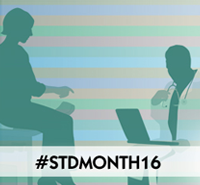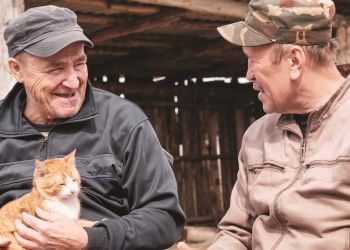 The theme for STD Awareness Month 2016 is Talk. Test. Treat. Disease Intervention Specialists (DIS) play an important role in local health department HIV/STD programs and work to improve the sexual health of their community by talking to them about STD prevention, testing in the field, and linking the clients in need to care. For STD Awareness Month, NACCHO spoke to Ryane Hill, a DIS at Hamilton County Health Department in Ohio, who serves on NACCHO’s HIV & STI Prevention Workgroup about her role as a DIS.
The theme for STD Awareness Month 2016 is Talk. Test. Treat. Disease Intervention Specialists (DIS) play an important role in local health department HIV/STD programs and work to improve the sexual health of their community by talking to them about STD prevention, testing in the field, and linking the clients in need to care. For STD Awareness Month, NACCHO spoke to Ryane Hill, a DIS at Hamilton County Health Department in Ohio, who serves on NACCHO’s HIV & STI Prevention Workgroup about her role as a DIS.
How long have you been a DIS and what does this role entail?
I have been a DIS for almost two years. In my role as a DIS in Cincinnati, I have many different responsibilities related to sexual health education. One of the main tasks that I am responsible for is conducting disease investigations for HIV and syphilis. I engage with individuals who have been infected or exposed to HIV or sexually transmitted diseases (STDs) and provide risk-reduction education, counseling, and follow up with treatment guidelines. Another role that I have is to provide STD and HIV education and outreach in the community by participating in health fairs, workshops, and conducting presentations in the classrooms. Lastly, I conduct testing for HIV and syphilis in the clinic as well as outreach settings.
The theme for STD Awareness month is Talk. Test. Treat. Can you describe the work you do to talk to your clients about sexual health, test for STDs, and link those in need to treatment?
I feel like talking is the most important part of the job. Being able to effectively communicate with individuals and meet them where they are in their understanding of their care is vital to treatment and future prevention. Talking also includes listening. Many times clients need someone who is willing to listen to their story and build rapport before they are comfortable moving forward to engage in care. Other times a client may not be ready to link to care right away, but may return months later, having held on to some of the things we talked about initially and now being ready to proceed with treatment.
In my role as a DIS testing is done just about every day and in many different environments. Partner services, a component of disease investigation, involves contacting partners of newly diagnosed positives and getting them tested and connected to treatment. Testing can often be done out in the field (client’s home, testing van, etc.) as well as within the clinic setting. Offering testing at a number of sites is an important way to ensure broader access within the community.
Linkage to treatment is also essential in assisting individuals. As a DIS, I help educate clients on forms of treatment, resources available, and provide transportation to their visits if necessary. If treatment is ongoing, I follow-up on their care to ensure they have been properly treated.
What is the most rewarding thing about being a DIS?
The most rewarding thing for me about being a DIS is helping someone get through the process of talking, testing, and treatment (if necessary). I’ve experienced clients who are afraid and nervous. Being able to walk them through the process by providing support, education, and additional resources helps them feel relieved. Seeing the feeling of relief they have is the best part.
Over the past year you have participated as a Subject Matter Expert to help inform the national DIS Certification Project. Can you describe what this effort is and what your experience being on the SME Advisory Group has been like?
The Public Health Accreditation Board (PHAB), the Centers for Disease Control and Prevention (CDC), NACCHO, and the National Coalition of STD Directors (NCSD) are working together to establish the framework for a national DIS certification program. One component of this framework is the creation of a job task analysis. A job task analysis helps identify what tasks and knowledge are needed for a DIS to perform his or her work. This legally defensible product will inform the creation of a job description and the testing requirements for certification. The purpose of the SME Advisory Group was to inform the job task analysis process through a series of meetings and focus groups with DIS from all over the United States.
The group initially met back in July 2015 and reviewed all job tasks performed by DIS and other health professionals that work in the area of expertise in STD, HIV, TB, and other communicable diseases. This was a lengthy process as DIS often perform very different tasks according to their specific regions, facilities, current outbreaks, and target populations. After this two day meeting, PSI Services (the organization contracted with to do this work) formulated all areas of knowledge, tasks, and skills into a survey that went out to DIS to gather more information on their work. Approximately 494 DIS responded to the survey and the information gained has helped validate the practice description and create an overall job description for certification. After closing the survey, the group met again earlier this year to discuss the results and next steps.
I felt honored to be a part of this team because a national DIS certification program is a huge step in the field of public health and for DIS. The role of a DIS is constantly changing, due in part to the needed response to healthcare emergencies and outbreaks. Creating this certification will help to ensure that we are all equipped to perform when the need arises. This meeting was also a great opportunity to meet other DIS and learn about what is being done in other jurisdictions, create new connections, and network with other public health professionals.
Is there anything else you would like to share?
I love my job!
To read more about DIS Certification, visit the following:
- DIS Certification, PHAB
- Strengthening Public Health at Its Core: A Focus on Disease Intervention Specialists, NACCHO Exchange, Winter 2015
- Job Task Analysis in the DIS Certification Process: They really do all that?, NCSD Blog








